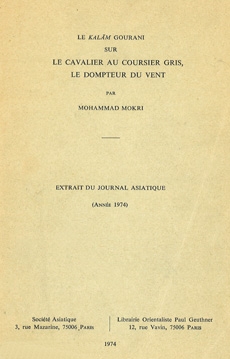
Le Cavalier Au Coursier Gris
Mohammad Mokri
Paul Geuthner
Les prouesses et les bienfaits de l’Agent céleste et du Guide des Compagnons chargé de faire marcher les affaires du monde font l’objet d’un petit opuscule inséré dans le recueil de Daftar-i Khazāna-y Pirdī-warī2, «Livre du Trésor de Pirdīwar»; cela en dehors des nombreuses citations dispersées à son sujet parmi les différents ouvrages anciens de la langue gouranie.
1 Dans une étude antérieure (Les vents du Kurdistan, dans J. A., 1959, pp. 472-505) j’ai étudié la terminologie, les aspects météorologiques, folkloriques et légendaires des vents ainsi que ses répercussions dans la vie rurale et agricole. Dans celle-ci, complémentaire de la première, je me place uniquement sur le plan mythico-religieux et sur certaines données non abordées auparavant en évitant toutes répétitions même en rapport étroit avec les thèmes étudiés ici. Une troisième en perspective, dont la préparation est largement avancée, suivra, en temps utile, ces deux essais.
Summary
The Rider of The Grey Steed, T Amer of The Wind
The deeds of prowess and the missions of the Celestial Agent, Guide of the Companions, mainly entrusted with furthering the affairs of the world, are depicted in a hitherto unpublished opuscule of the Ahl-i Haqq (the Wor- shippers of Truth) in old Gurani language. This Agent, one of the Seven Entities commonly known as the Haft-tan (the Seven Companions) is identified with the Angel Mîkâ’îl, often called Pîr-Dâwûd and surnamed Kaw-sûâr (the Rider of the Grey Steed). The wind, considered as a mount, is placed under his authority. The Kaw-sûâr is pre-eminently the Justicer, ready to succour and to respond to any call anywhere. According to a mythical-historical event (as narrated in the Dawra-y Dîwâna-gawra), he rode the wind and rescued a ship in distress, aboard which were the Master of the pre-eternal Pact and a host of adepts of other creeds. He pulled the ship out of the clutches of the Whirlpool and was rewarded by a gift from the King of the world.
Apart from Islamic Shiite elements, traces of ancient Iranian and Mesopotamian myths under their folkloric guise are mingled with the functions ascribed to this Entity.
The phenomenological and comparative study of ideas and religions, as well as the analysis of the epical and mythical themes (and of the doctrines which orthodox Islam regards as heretical), remain fruitful and enlightening in this respect. A comparison has been made here between the Rider and the Avestic Vâyu (and his acolyte Vragna, the god of Victory). Several data contained in the Bahrâm-yasht and Râm-yasht (the 14th and 15th y as ht of the Avesta), as well as in the Pahlavi Mazdean texts on cosmogony, are also discussed here. Islamic legends and in particular folkloric data precede the comments and the explanatory notes which accompany the text and the translation.
An earlier study (M. Mokri, «The Winds of Kurdistan», J.A., 1959, pp. 472-505) examines the terminology, the meteorological, folkloric and legendary aspects of the winds, as well as their beating on the rural and agricultural life. These two essays will be followed by a third one in due time.
| 